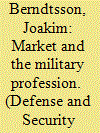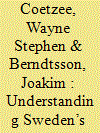|
|
|
Sort Order |
|
|
|
Items / Page
|
|
|
|
|
|
|
| Srl | Item |
| 1 |
ID:
126795


|
|
|
|
|
| Publication |
2013.
|
| Summary/Abstract |
The increasing reliance on private security companies (PSCs) in and around international peace operations has created new public-private constellations, influencing both military and civilian efforts, sometimes generating problematic relationships and even violence between public and private actors, as well as unclear divisions of labour, authority and responsibility. To explain how and why these problems occur, mapping out the understandings that these different actors have of each other in different contexts is of key importance. Through an analysis of Swedish officers' views of private security actors, this paper aims to contribute to our understanding of the complex relationships between civilian authorities, state militaries and commercial security actors. Particularly, the article will shed new light on 'PSC-military' relations and the ways in which the private security sector functions as both a competitor and a career option for former or active service personnel. The article draws on a study commissioned by the Swedish Armed Forces and is empirically based on in-depth interviews and a survey of Swedish officers' attitudes to PSCs.
|
|
|
|
|
|
|
|
|
|
|
|
|
|
|
|
| 2 |
ID:
165363


|
|
|
|
|
| Summary/Abstract |
The rise of private military and security companies (PMSCs) challenges our notion of military professionals. PMSCs bring new claims to professional status and legitimacy outside military institutions and represent an increasing diffusion of - and competition over - military and security expertise. In light of this development, understanding the formation of professional identities in military and private security organisations is as an important undertaking. This paper contributes to this endeavour by analysing professional self-images in the Swedish Armed Forces and how these relate to PMSCs. The study is based on data collected from official documents, semi-structured interviews and a small-scale survey among senior military officers. Focusing on military understandings of PMSCs and contractors, the analysis provides much-needed insight into relational aspects of professional identity formation outside the US context. Furthermore, it points to discrepancies in organisational and group levels in understandings of commercial security actors, and paves the way for future research.
|
|
|
|
|
|
|
|
|
|
|
|
|
|
|
|
| 3 |
ID:
109464


|
|
|
|
|
| Publication |
2011.
|
| Summary/Abstract |
The increasing privatization of security and the changing patterns of security governance call into question the foundational lines of demarcation between the "public" and "private." This article investigates how key actors in the security assemblage at Stockholm-Arlanda Airport make sense of their roles in relation to public-private distinctions. While central to the ways in which security actors understand themselves and each other, closer inspection reveals that the drawing of these lines is also highly ambivalent and contested-in relation to questions of control and regulation, authority, as well as security rationalities. Further, "private-private" and "public-public" contestations also are informed by the obdurate public-private distinction.
|
|
|
|
|
|
|
|
|
|
|
|
|
|
|
|
| 4 |
ID:
136446


|
|
|
|
|
| Summary/Abstract |
Over the past few years, Sweden has markedly shifted its position on private military and security companies (PMSCs), from widespread reluctance and general suspicion to increasing acceptance and normalization, along with a gradual institutionalization of the use of PMSCs by Swedish state agencies. On the one hand, this development is part of the broader trend of security commercialization in Europe and globally. On the other hand, it is both shaped by, and shapes, changes within Sweden, where the past years have seen important shifts in foreign and security policies, as well as a substantial transformation of the Swedish Armed Forces, with the ongoing transition from a conscript system to an all-volunteer force (AVF) being the most visible. Drawing on interviews with state officials, records from parliamentary debates, and official government documents, this article analyzes the shift from reluctance to acceptance and identifies and discusses possible future implications of this increased reliance on PMSCs in the context of Swedish military and security transformation, particularly in relation to issues of security governance and civil–military relations and cooperation.
|
|
|
|
|
|
|
|
|
|
|
|
|
|
|
|
| 5 |
ID:
139203


|
|
|
|
|
| Summary/Abstract |
This article analyzes the legislative processes and the creation of security governance structures in a recent move by Scandinavian countries to authorize the use of armed guards on commercial vessels. Findings reveal that while there are many similarities, the cases (Denmark, Norway, and Sweden) differ in terms of government control, oversight, and governance of private security providers, as well as in the management of firearms and the use of force. The article concludes that all three countries have adopted an approach that creates a “semblance” of state control and regulation but which also entails substantial delegation of authority to private actors.
|
|
|
|
|
|
|
|
|
|
|
|
|
|
|
|
| 6 |
ID:
110914


|
|
|
|
|
| Publication |
2012.
|
| Summary/Abstract |
Private security companies (PSCs) do not merely provide protective services; they also sell specific understandings of the world and of security problems. Promoting their services, PSCs project images of professional security expertise. This article contributes to our knowledge of commercial security experts by analysing the ways in which images of expertise are constructed, focusing on the contracting of a PSC in 2008 by the Swedish Ministry for Foreign Affairs. Drawing on material from interviews, the company website and the contracting process, the article explores 'public' and 'professional' self-images, and shows how these images differ in important respects, underlining the need to see private security expertise as multifaceted and contradictory. The article also reveals problems of using categories such as 'public' and 'private' when analysing private security, thus feeding into the debate on definition, and provides important insights into the potential role of PSCs in shaping understandings of, and decisions on, security issues.
|
|
|
|
|
|
|
|
|
|
|
|
|
|
|
|
| 7 |
ID:
138760


|
|
|
|
|
| Summary/Abstract |
This article analyzes public opinion of the armed forces, focusing on Sweden and the
United Kingdom. The cases offer interesting similarities, such as their institutions of parliamentary monarchies and, most recently, their reliance on all-volunteer force, as well as differences especially with regard to their experience of international defence missions. The discussion considers the extent to which the public has been supportive of recent missions conducted by Swedish and UK armed forces, and whether such support is also accompanied by support for the armed forces as an institution. Levels of opinion and trust in the military are quite different in both cases, and public opinion of international missions reflects the contrasting historical engagements of both states. In both cases, we also find a divergence between what
publics are willing to support and what national governments wish to pursue as missions
for their armed forces.
|
|
|
|
|
|
|
|
|
|
|
|
|
|
|
|
| 8 |
ID:
190867


|
|
|
|
|
| Summary/Abstract |
This article aims to map out and analyse how Sweden’s security economy is shaped and sustained through security policies, political decisions, and personal connections amongst commercial and state elites. We treat the arms and security service industries as two sides of the same coin. In doing so, we address a shortcoming in the security literature that often analyses these two fields as separate areas of study with their own set of logic, research questions, theories, and methodologies. By bringing these two areas together, our study contributes to knowledge of the relationship between commercial defence and security actors and the state and a deeper understanding of Sweden’s security economy.
|
|
|
|
|
|
|
|
|
|
|
|
|
|
|
|
|
|
|
|
|